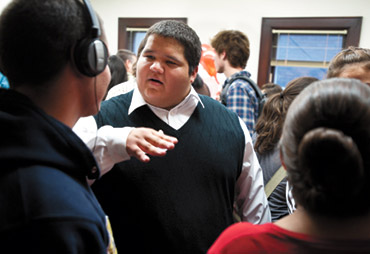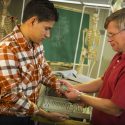Reaching beyond the boundaries of the university
David O’Connor, admission counselor and UW–Madison’s American Indian recruiter, is no stranger to travel.

David O’Connor, a counselor with the Office of Admissions, talks with undergraduates — many of whom he helped to recruit — during an American Indian Student Welcome at the new Native American student organization offices on Brooks Street.
Photo: Jeff Miller
In his work recruiting American Indian students, O’Connor travels extensively throughout the Midwest, talking with students from the various states’ federally recognized American Indian tribes and communities.
O’Connor, one of five siblings, was born and raised with one of these Wisconsin American Indian Nations: he a member of the Bad River Band of Lake Superior Chippewa Indians, commonly known as Ojibwe.
O’Connor knew at a young age that he wanted to attend UW–Madison for college, but in his home community, the majority of people did not go to college. So around 1994, when the Badgers sparked national attention by making it to the Rose Bowl for the first time in many years and O’Connor attended his first football game in Camp Randall, he picked up an admissions publication, looked at the expectations for freshman admission, and began preparing.
The road here was not easy.
“I came from a loving and supportive family, but we did not have many material possessions,” he says. Growing up in a two-bedroom trailer, he never owned a bed of his own and for the majority of his life, he slept on the floor.
His family consistently pushed the importance of getting an education, though, and O’Connor’s father, a veteran, worked in construction to support his family. His mother often worked odd jobs to make ends meet.
“No one told me the steps I’d need to take to get into college,” O’Connor says. Throughout high school, he followed Office of Admissions publications closely, taking rigorous courses. “Even though I wanted to take the minimum in certain subject areas, I was consistently encouraged by my high school’s American Indian counselor to go above and beyond, for example by taking four years of German instead of two.”
O’Connor challenged himself, achieved academically, and eventually gained admission to the university.
UW–Madison’s Center for Educational Opportunity Program (CEO) helped O’Connor transition between college and high school, because moving from such a small community to such a large one was often overwhelming.
“I kept pushing myself and seeking assistance from CEO staff, friends, my parents and different community members, who gave me the support and drive to keep charging ahead,” O’Connor says. “Before I knew it, I was finished with college.”
O’Connor majored in history and also received certificates in American Indian Studies and Chican@ and Latin@ Studies.
But his higher education did not stop there. Straight out of college, he entered UW–Madison’s graduate program in educational leadership and policy analysis. He also began working with the Pre-College Enrichment Opportunity Program for Learning Excellence (PEOPLE) as a statewide student services specialist.
PEOPLE, a rigorous pre-college pipeline for highly motivated students of color and low-income students, most of whom are the first in their families to attend college, prepares students to apply to and enroll at UW–Madison.
With PEOPLE, O’Connor worked hands-on with Wisconsin students. He tutored them, explored their academic and career interests, and helped them gain the professional knowledge needed to be successful at UW–Madison.
He also performed outreach with tribal communities, building interest in pre-collegiate programs on campus such as PEOPLE, the Engineering Summer Program, the Summer Science Institute and the Research Apprentice Program.
This work was a prelude to his work in the Office of Admissions, which he joined in September 2008. O’Connor did not land in admissions accidentally; his goal was to give back to others the kind of advising and mentoring that he had been given.
“The greatest joy,” O’Connor says, “is traveling to areas and communities where I grew up and giving students like me the opportunity to reach their lifelong goal of attending our state’s flagship educational institution.”
As part of his admissions work, O’Connor travels to high schools and college fairs throughout the Midwest. At these events, O’Connor hears students’ excitement over aspects of UW–Madison similar to what motivated him to attend college here: the variety of majors, long-standing traditions and athletic programs.
“Some students say they are coming here specifically to study kinesiology and others have grown up on Badger football,” he says.
The biggest transition facing students from the communities David works with is a cultural one. He says that it can initially be hard to come from a smaller community or rural environment with a shared culture to a large, urban center.
For O’Connor, the biggest challenges were “how I talked and dressed and the way my peers saw me. They weren’t trying to make me feel uncomfortable; I just sensed that I had different high school experiences and a different culture than they had.”
O’Connor’s work has allowed him to engage not only with students across the state, but to participate in campus events that bring visibility to the American Indian academic community.
In early April, he spoke at the sixth-annual Indigenous Health and Wellness Day, an event that draws American Indian students to the UW–Madison campus to learn about science and health professions. Participating students were also introduced to American Indian health science professionals and students who had successfully navigated pre-college and college programs.
O’Connor’s outreach has paid off.
All told, UW–Madison currently has 350 American Indian students enrolled in undergraduate, graduate and professional programs. Undergraduates make up 200 of that figure, and last year saw the largest incoming class of 66 American Indian freshmen. O’Connor comes across most of those applications at some point.
O’Connor is proud not only of his campus work, but the effect he has seen reverberating throughout his family.
“As an uncle, I want to make sure I communicate the opportunities available to my two nieces. I tell them they will all sport red and white some day. And if you ask my 7-year-old niece where she wants to attend college, she’ll say ‘Wisconsin, just like my uncle.’ It makes me feel good to see that my family members envision world-class universities like Wisconsin as possibilities.”
O’Connor doesn’t see his education as static, either; he plans someday to earn his Ph.D.
O’Connor believes it is critical to give high school students the knowledge necessary to ready themselves for college. His advice to the population of students he works with is great advice for all: “The college application process doesn’t start when you are a senior in high school. Begin researching and planning early. Each year is a building block. If you don’t take one step, you can’t take the next.”
Tags: diversity, faculty and staff

